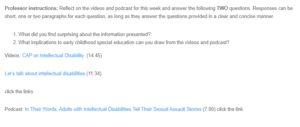Discussion – Intellectual Disability
Drugs have been used to modulate human physiology and optimize well-being. The motivation behind taking drugs is often informed by the specific effect the drug has on the body. Drug use is defined as an episodic use of a medicinal substance for recreational or treatment purposes. The choice often varies. The most commonly used drugs include alcohol, marijuana, caffeine, Tylenol, and ibuprofen. These substances have been used contextually in mixed settings. While some, such as ibuprofen, maintain use as conventional analgesics of profound benefits for clinical purposes, others, such as alcohol, continue to be used socially. Social use of substances has been implicated in drug abuse and consequent adverse health effects of drug abuse.
Drug Use
Drug abuse, perhaps used synonymously with drug use in some contexts, differs from drug use in some respects. People who abuse drugs often have an extreme desire and compulsion to use these substances. Drug abuse is defined as the use of medicinal substances in ways not intended for by a prescriber. The manifestation of drug abuse ranges from socially using psychoactive substances for their euphoric effects to borrowing a pill from a friend. Notwithstanding, the motivation behind abusing a drug differs across individuals. Abusing psychoactive substances may result in addiction and the subsequent health effects of addiction.
Drug Addiction
Drug addiction is a complex disorder characterized by compulsive drug seeking and difficulty in controlling the behavior despite its adverse health consequences. The pathophysiologic principle underlying drug addiction is centered on the reward circuitry of the brain (NIDA, 2018). Many addictive substances of abuse produce euphoric effects whenever they are taken. Whenever a person takes a substance of abuse, the reward circuit in the brain is stimulated, causing euphoria. Additionally, dopamine, a reward neurotransmitter, is produced (NIDA, 2018). With continuous use, these reward centers are increasingly potentiated, motivating an individual to continue taking the substance. The dopamine surge associated with this potentiation causes pleasure reinforcements, further contributing to the addiction.
An issue of concern in drug addiction is the subsequent physiological impacts that the abused medications have on the body. Depending on the abused drug, various adverse effects can occur to drug addicts. These include hepatic complications for chronic alcoholics, lung disease for smoking addicts, substance abuse disorders, and other mental health illnesses.
Substance Abuse and Mental Health
Drugs and substance abuse have been implicated in several mental health disorders. NIDA (2018) notes that the long-term use of substances and drugs of abuse may affect the cognitive functionalities of individuals. Cognitive and behavioral alterations that proceed with the use of psychoactive substances remain features of most mental health illnesses and a reason for the functional deficits seen in these persons (Corcoran & Walsh, 2015). Drugs and substance use are risk factors for mental health illnesses such as substance abuse disorders, depression, Alzheimer’s, and schizophrenia, among others. The most commonly implicated substances of abuse include alcohol, tobacco, opioids, stimulants, and cannabis.
The relation between substance abuse and mental health is further highlighted by the neurobiological studies on the same. The neurobiological alterations attributed to chronic use of substances of abuse, such as nicotine and alcohol, are known to potentiate an underlying predisposition to these illnesses. Many epidemiologic studies revealed that mental health disorders have a predilection for substance abuse. The predisposition to common mental health disorders is up to twice as high in persons taking substances of abuse than the rest of the population (Beeber, 2019). This highlights the need to curtail drug abuse as a health promotion initiative against mental health disorders.
References
Beeber, L. S. (2019). Mental health issues and substance use in the United States: Pulling the power levers. Journal of the American Psychiatric Nurses Association, 25(1), 19–26. https://doi.org/10.1177/1078390318811572
Corcoran, J., & Walsh, J. (2015). Ch. 15. In Mental Health in Social Work: A casebook on diagnosis and strengths-based assessment (3rd ed.). Pearson Education.
NIDA. (2018). Understanding drug use and addiction drug facts. https://nida.nih.gov/publications/drugfacts/understanding-drug-use-addiction
ORDER A PLAGIARISM-FREE PAPER HERE
We’ll write everything from scratch
Question

Discussion – Intellectual Disability
Professor instructions: Reflect on the videos and podcast for this week and answer the following TWO questions. Responses can be short, one or two paragraphs for each question, as long as they answer the questions provided in a clear and concise manner.
- What did you find surprising about the information presented?
- What implications to early childhood special education can you draw from the videos and podcast?
Videos: CAP on Intellectual Disability (14:45)
Let’s talk about intellectual disabilities (11:34)
click the links
Podcast: In Their Words, Adults with Intellectual Disabilities Tell Their Sexual Assault Stories (7:00) click the link

